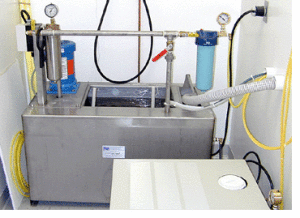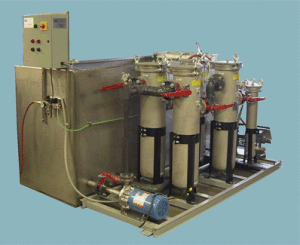Metalworking Filtration Systems
Coolant Filter and Recirculation Systems
A coolant filter maintains the condition of the coolant and a coolant filter extends the life of the coolant. Coolants are liquids which perform the following functions in support of an industrial process:
- Coolant Filters allow for Recirculation and ReUse of the Liquid Coolant.
- A Coolant Filter cleans solids from the work piece and tool.
- Coolant Filters allow for continuous lubrication of the work piece and tool.
- A Coolant Filter protects the surfaces of the work piece and the tool.
- Coolant Filters maintain recirculation which allow for cooling of the work piece and tool.
Coolant Filter design can take emphasis from any or all of the functions above.
 The system at left recirculates the coolant through two very fine 1 Micron and 0.35 micron coolant filters. In addition the pump maintains an output pressure for the workpiece at 44 PSI, with the chiller holding the proper coolant temperature. These variables need to be maintained to produce the proper finish of the quartz etched workpiece. We have also placed a coolant filter on the inlet water to prevent particles from the city makeup water from interfering with the fine grinding operation
The system at left recirculates the coolant through two very fine 1 Micron and 0.35 micron coolant filters. In addition the pump maintains an output pressure for the workpiece at 44 PSI, with the chiller holding the proper coolant temperature. These variables need to be maintained to produce the proper finish of the quartz etched workpiece. We have also placed a coolant filter on the inlet water to prevent particles from the city makeup water from interfering with the fine grinding operation
In coolant filter design, an often overlooked function is coolant flow and pressure. Coolant filters need to allow sufficient flow and pressure so the liquid coolant can transport the contaminants created away from the manufactured work piece. Coolant Filter design overlooks flow and pressure they are not inherent properties. Coolant Filter flow and pressure only become a property when the proper flow and pressure are applied to the coolant, through the coolant filter and then through it to the work piece.
Coolant filters were used long before recycling became fashionable. Industry has used coolant filters and recycled industrial liquids used as coolants for many years.
Design of Coolant Filters have become finer and finer as industrial processes have become finer and finer. In addition, a typical coolant filter is much finer than it used to be because pollution requirements have become more strict.
Coolant Filter design fundamentally looks at the type of coolant used. A coolant filter must be compatible with a range of synthetic oils, oil based fluids, lube oils and water soluble emulsions. Coolants can also be simply tap water. At the other end of the scale coolant filters have to be compatible additionally with purified water and special oils and additives selected for their properties in supporting the coolant filter process.
Coolant Filter: The most practical note: Logistics
 Because coolant filters support processes which generate solid contaminants the logistics of moving the solid contaminants can dominate the solution. Moving the correct amount of fluid through the coolant filter under the right pressures and flows even when the fluid carries significant solids present challenges to the designer. Often the first step in the solution, is to determine simply how many pieces of solids are present that must be removed by the coolant filter. From there we ask how many solids are made on a continuing basis and how many the process can tolerate. Getting solids and liquids from place to place are the logistics of coolant filter systems whci allow for continuous coolant reuse.
Because coolant filters support processes which generate solid contaminants the logistics of moving the solid contaminants can dominate the solution. Moving the correct amount of fluid through the coolant filter under the right pressures and flows even when the fluid carries significant solids present challenges to the designer. Often the first step in the solution, is to determine simply how many pieces of solids are present that must be removed by the coolant filter. From there we ask how many solids are made on a continuing basis and how many the process can tolerate. Getting solids and liquids from place to place are the logistics of coolant filter systems whci allow for continuous coolant reuse.
Metalworking Coolants??
Often Coolant Filter systems these days are for Non Metallic workpiece and their Coolants. We used to call these systems metalworking coolants but often they are not on metals. A sign of the times.
We were asked to design the coolant filter system at the right to support a fine grinding operation of an optical grade ceramic with a very light water soluble oil fraction.
This coolant filter system takes advantage of settling as the initial treatment before using bag filters as pretreatment in the first 2 housings followed by bag sized cartridge filters for the very fine 1 micron plus filtration required in this application. The key design factor is in the settling step which allows for practical use of the extra tight bag and cartridge coolant filters.
What to do next.
If you are interested in a coolant filter, a coolant recirculation and reuse system, or suggestions on how to improve the coolant filter process that you currently use, please contact us.
We would welcome the opportunity to work with you on your coolant filter process.
Call us at 603-434-9577 or contact us for more information.